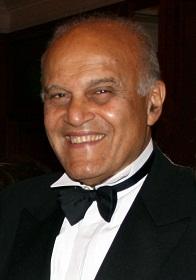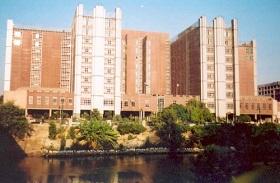Using AI to control energy for indoor agriculture
30 September 2024
Published online 28 April 2011

An oft-told story in Egypt's science community tells the tale of why Magdi Yacoub left Egypt to become a world famous surgeon in the United Kingdom. An Egyptian Christian, he had his thesis rejected by his Muslim supervisor, allegedly because of religious discrimination. He moved to the United Kingdom in 1962 where he established the world's largest heart and lung transplant programme. Yacoub was celebrated for his work and knighted by Queen Elizabeth II in 1992.
In January 2011, former Egyptian President Hosni Mubarak presented Yacoub with the Greatest Nile Collar, Egypt's highest civilian decoration, in recognition of Yacoub's distinguished career and contributions to science and humanity. Following this award, his one-time former supervisor reportedly said that Yacoub wouldn't have achieved all this if he hadn't rejected his thesis.
After the bombing of a church in Alexandria, Egypt, on New Year's Eve 2010, simmering tensions between the Coptic Christians, Egypt's ethnic Christians who make up around 10% of the population, and Muslim communities came to the fore. Less than one month later, however, the popular revolution that ousted Mubarak's regime united them in their , determination to build a new Egypt free from prejudice. But the violence that erupted after a church on the outskirts of Cairo was set alight in March 2011 was a reminder that the road to peaceful co-existence is long and the aggrieved calls of Christians rang louder.
Christians in Egypt have long complained of being marginalized in society, last in line for jobs and other opportunities. The science sector is not exempt. According to several scientists, Muslims and Christians, scientists are being favoured for jobs on religious grounds.
*Imad Fahim, a Christian cardiologist, feels there is blatant bias against Christians. "In universities, at hospitals, Muslims are always favoured. Copts are failed deliberately, and we cannot obtain residencies of our choice because we are Christian," he says.
*Maged Zaki, an embryologist, with the Egyptian IVF-ET Center, is a Christian. He says he hasn't experienced prejudice. "There is no religious discrimination. There's subtle class discrimination. If you belong to the 'right' class, it doesn't matter if you're Muslim or Christian." He's sceptical of those who play the "religion card". "Either you're qualified or not. It comes down to merit."

A gynaecologist by training, *Ahmed El-Baaly was an undergraduate student at Suez Canal University (SCU), Egypt. He talks of departments segregated by religion. "The neurosurgery department is controlled by Muslims, and to my knowledge, there's never been a Christian resident."
Somaya Hosny, dean of the Faculty of Medicine at SCU, who's Muslim, says this is untrue. "Only one or two departments do not include Christian staff, but this is because either the grades of the Muslim applicants, who are 90% of the population, are higher or because no Christian candidates prefer to go to this department."
Hosny is adamant positions are based on merit. "I'm giving leadership positions to many Christians. We currently have two Christian women working as head of departments. Many Christian faculty members get nationally-funded research grants. This also depends on competence and experience of applicants."
Nevene Ramsis the female Christian head of the pathology department at SCU, affirms Hosny's statements. "I did not experience discrimination in my faculty. I am the chair of the department according to my seniority among professors in my department."
However, Ramsis says the situation is different at the Universities of Cairo and Ain Shams. "I hear many stories where young Christian doctors are prohibited from joining some departments, such as obstetrics, gynaecology or urosurgery."
Ramsis has two sons at Ain Shams University. "They were advised not to join certain departments as they wouldn't get their thesis, fellowships or any grants."
"Consequently", she adds, "some Christians don't employ Muslims."
Ahmed Sonoussy, head biologist at the Faculty of Veterinary Medicine at Cairo University, vehemently denies any segregation or discrimination there. "If you visit my faculty you will see Muslims and Christians working together in the same departments. We are one unit, not separated by religion."
He led the team which recently produced Egypt's first avian flu vaccine. When asked if Muslims are favoured over Christians with regard to research grants and opportunities, he reiterates, "Funding is given to scientists who deserve it and are doing good work. It doesn't matter if you're Muslim or Christian."
El-Baaly, a Muslim, worked part-time at St. Peter Hospital, a private Christian hospital in the uptown Heliopolis neighbourhood in Cairo. "I wasn't offered a full-time job, since the hospital only hires Christian doctors", he explains. He adds that Muslim patients are not admitted.
At Cleopatra Hospital, one doctor who refused to be named said their preference was to admit Christian patients, "but we take in Muslims too."
Maila Mansour, a Muslim quality manager at Cleopatra Hospital, refutes this. "I'm a Muslim and I'm working at a Christian hospital. We are not concerned with the issue of religion. We admit anybody. I don't think there's any hospital in Egypt which turns away patients because they're Muslim or Christian."
Although Zaki does not think Christians are treated unfairly, he feels there's an Islamic element that should be removed. "The Hippocratic oath has been altered and contains references to Islam", he alleges. "The oath should be neutral."
He is hopeful that any bias will decrease as Egypt transitions towards democracy. "It will take time to erase the past, but Christian– Muslim unity can be achieved. We lived under a dictator who used the divide and conquer rule. Now we want to change that."
Ramsis is not so optomistic. "Many Muslim radicals have been released from prison and started to disseminate their radicalism among youth", she says. "It is really a disaster we are facing."
*These people were given pseudonyms to protect their identity.
doi:10.1038/nmiddleeast.2011.51
Stay connected: